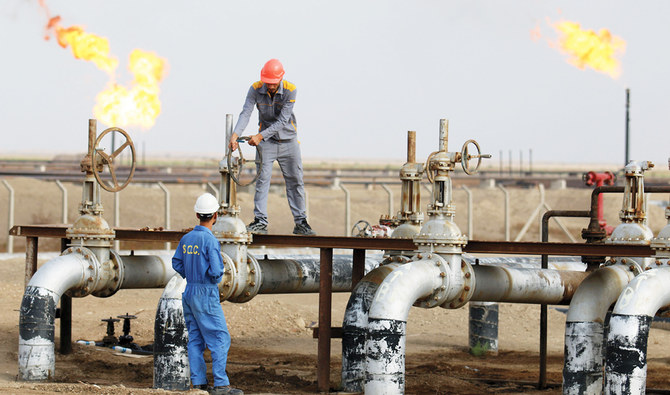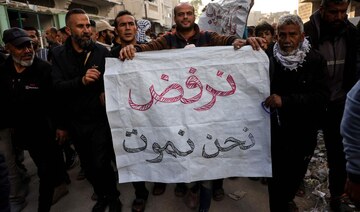JERUSALEM: The Israeli army’s chief spokesman on Wednesday appeared to question the stated goal of destroying the Hamas militant group in Gaza in a rare public rift between the country’s political and military leadership.
Prime Minister Benjamin Netanyahu has insisted Israel will pursue the fight against Hamas, the group running the besieged Gaza Strip, until its military and governing capabilities in the Palestinian territory are eliminated. But with the war now in its ninth month, frustration has been mounting with no clear end or postwar plan in sight.
“This business of destroying Hamas, making Hamas disappear — it’s simply throwing sand in the eyes of the public,” Rear Adm. Daniel Hagari, the military spokesperson, told Israel’s Channel 13 TV. “Hamas is an idea, Hamas is a party. It’s rooted in the hearts of the people — whoever thinks we can eliminate Hamas is wrong.”
Netanyahu’s office responded by saying that the country’s security Cabinet, chaired by the prime minister, “has defined the destruction of Hamas’ military and governing capabilities as one of the goals of the war. The Israeli military, of course, is committed to this.”
The military quickly issued a clarification, saying it was “committed to achieving the goals of the war as defined by the Cabinet” and that it has been working on this “throughout the war, day and night, and will continue to do so.”
Hagari’s comments, it said, “referred to the destruction of Hamas as an ideology and an idea, and this was said by him very clearly and explicitly,” the military statement added. “Any other claim is taking things out of context.”
There have already been open signs of discontent over the handling of the war by Netanyahu’s government, a coalition that includes right-wing hard-liners who oppose any kind of settlement with Hamas. Months of internationally mediated truce talks, including a proposal floated this month by President Joe Biden, have stalled.
Benny Gantz, a former military chief and centrist politician, withdrew from Netanyahu’s war Cabinet earlier this month, citing frustration over the prime minister’s conduct of the war.
And early this week, Netanyahu expressed displeasure with the army’s decision to declare a “tactical pause” in the southern Gaza city of Rafah to help deliver humanitarian aid to the besieged territory. An aide said Netanyahu was caught off guard by the announcement, and Israeli TV stations quoted him as saying “we have a country with an army, not an army with a country.”
Israel attacked Gaza in response to Hamas’ Oct. 7 cross-border attack into southern Israel, which killed some 1,200 people and took 250 hostage.
Israel’s war effort initially enjoyed broad public support, but in recent months wide divisions have emerged. While Netanyahu has pledged “total victory,” a growing array of critics and protesters have backed a ceasefire that would bring home the roughly 120 hostages still in Gaza. The Israeli military has already pronounced more than 40 of them dead, and officials fear that number will rise the longer the hostages are held.
Inside Gaza, the war has killed more than 37,100 Palestinians, according to Gaza’s Health Ministry, which doesn’t distinguish between combatants and civilians. The war has largely cut off the flow of medicine, food and other supplies to Palestinians, who are facing widespread hunger.
The United Nations said Wednesday that its humanitarian workers were once again unable to pick up aid shipments at the Kerem Shalom border crossing from Israel because of a lack of law and order.
UN deputy spokesman Farhan Haq said that although there were no clashes along the route where Israel has declared a daily pause in fighting, the lawlessness in the area prevented UN workers from picking up aid. This means that no trucks have been able to use the new route since Israel announced the daily pause on Sunday.
In recent weeks, Israel’s military has concentrated its offensive in the nearby city of Rafah, which lies on the border with Egypt and where it says Hamas’ last remnants are holding out.
More than half of Gaza’s population of 2.3 million people had earlier taken shelter in Rafah to escape fighting elsewhere in the territory, and the city is now nearly empty as the Israeli military carries out airstrikes and ground operations.
The Israeli military says it has killed over 500 militants and inflicted heavy damage on Hamas’ forces, but officials expect the operation to continue for at least several more weeks.
Israel also has taken over a 14-kilometer (8-mile) corridor along Gaza’s border with Egypt, including the Rafah border crossing. Footage circulating on social media shows the crossing blackened and destroyed, with only the former passenger terminal remaining intact. Before Israel moved into the area, the crossing was used to deliver humanitarian aid and to allow Palestinians to leave the territory.
The head of the Rafah municipality, Ahmed Al-Sufi, said Wednesday that Israeli strikes have destroyed more than 70 percent of the facilities and infrastructure. He accused Israeli forces of systematically targeting camps in Rafah, adding that entire residential areas in one neighborhood have been destroyed. Al-Sufi didn’t immediately respond to a request for additional information.
In a separate incident, 11 people were killed in an Israeli airstrike in Rafah, said Dr. Saleh Al-Hamas of the nearby European Hospital. There were no further details and the Israeli military had no immediate comment.





























